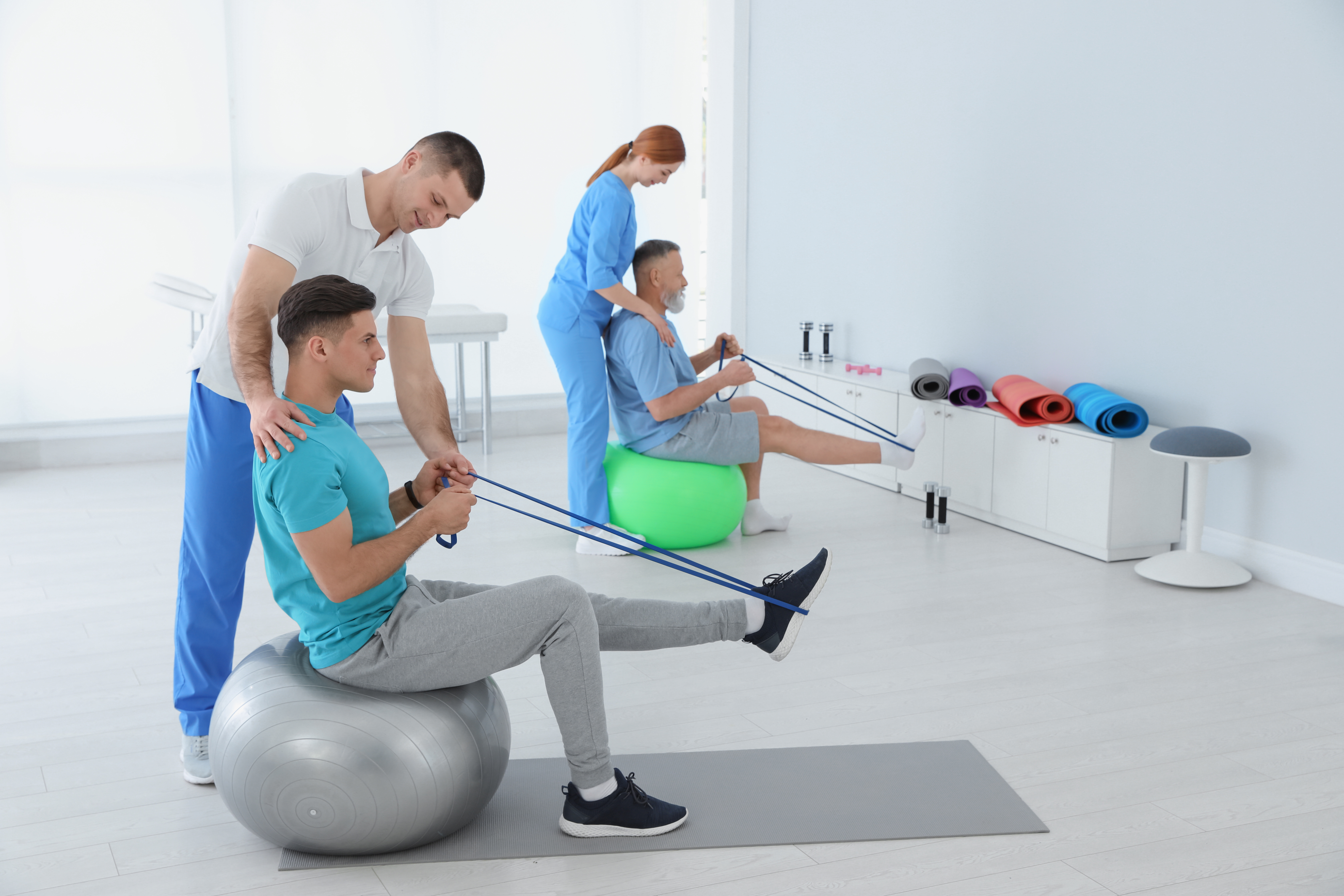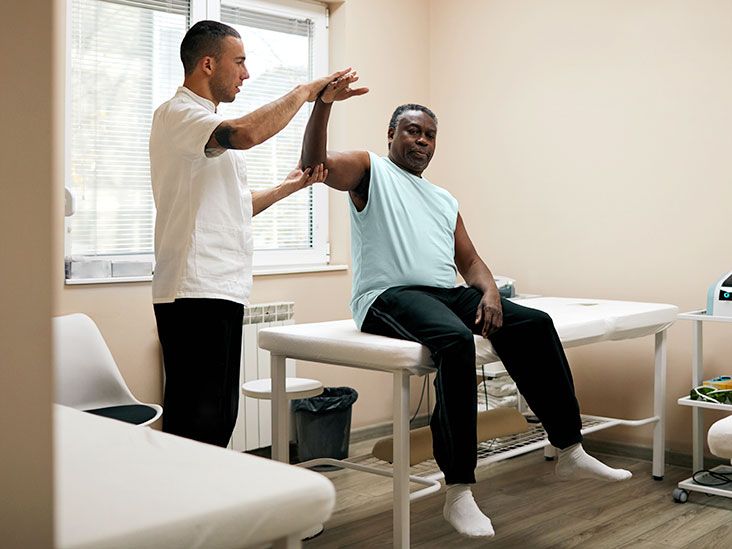Your Wellness, Our Priority: Unveiling the Best in Physical Therapy Roanoke
Your Wellness, Our Priority: Unveiling the Best in Physical Therapy Roanoke
Blog Article
Recognizing the Duty of Physiotherapists in Sports Medication
Understanding the function of physical specialists in sporting activities medication is critical for professional athletes and health care specialists alike. Physical specialists play a crucial function in examining athletes' injuries and problems, creating individualized therapy strategies, and executing recovery techniques. Teaming up with medical care specialists and trains, physical specialists supply thorough treatment to athletes, ensuring their total wellness and optimal performance.

Evaluating Athlete's Injuries and Issues
Physical specialists in sporting activities medicine play an essential duty in reviewing professional athletes' injuries and problems. The ability to accurately analyze an athlete's injury is essential in figuring out the suitable program of therapy and recovery.
During the assessment, physiotherapists collect crucial info such as the athlete's case history, previous injuries, and existing signs. They also do a comprehensive physical exam, analyzing variables such as variety of activity, security, versatility, and strength (Roanoke physical therapy). Unique diagnostic tests and imaging might also be utilized to additional evaluate the injury or problem
By performing this thorough assessment, physiotherapists have the ability to precisely diagnose the injury and create a personalized therapy plan. This may consist of therapeutic workouts, hands-on therapy strategies, and techniques such as heat or cool treatment. Furthermore, physiotherapists give education and guidance on proper methods for preventing future injuries, in addition to methods for enhancing performance and minimizing the danger of re-injury.
Creating Customized Treatment Strategies
Physiotherapists in sports medicine create individualized therapy strategies based upon their thorough analysis of a professional athlete's conditions and injuries. This process includes an extensive understanding of the professional athlete's clinical history, physical exam, and diagnostic tests. By collecting this info, the physical therapist can identify the underlying reasons for the injury or problem and establish the most appropriate training course of treatment.
The personalized therapy strategy intends to attend to the specific demands of the athlete and promote ideal recuperation. It might consist of a mix of healing exercises, hands-on therapy strategies, techniques such as warm or cold therapy, and education and learning on injury prevention. The physical therapist will likewise consider the athlete's goals, sport-specific needs, and timeline for go back to play when creating the treatment strategy.
In addition, the treatment strategy may progress gradually as the professional athlete advances in their recovery. Routine re-evaluations allow the physical therapist to examine the performance of the treatments and make any required adjustments. The utmost objective is to facilitate the professional athlete's safe return to their sporting activity while decreasing the risk of re-injury.
Executing Rehab Methods
The application of rehab strategies plays an essential duty in the therapy process for professional athletes in sporting activities medicine. These strategies are created to assist professional athletes recuperate from injuries, boost their efficiency, and stop additional injury. Physical therapists, as experts in motion and function, are accountable for carrying out these methods and leading athletes via their rehab journey.
One of the key facets of implementing rehab techniques is the assessment of the professional athlete's problem. Physical therapists examine the professional athlete's injury or problem, taking into consideration variables such as the seriousness of the injury, the athlete's goals, and their existing level of fitness. Based on this evaluation, the therapist develops an individualized therapy plan that includes certain rehabilitation techniques.
Recovery strategies can consist of a selection of interventions such as therapeutic exercises, hand-operated treatment, methods (e.g., heat, cool, electric stimulation), and useful training. These techniques are customized to attend to the professional athlete's specific demands and goals, intending to recover ideal function, lower pain, and enhance performance.
Throughout the rehabilitation procedure, physical specialists very closely check the athlete's progression and make any essential adjustments to the therapy plan. They also supply education and learning and assistance to the professional athlete on appropriate form, injury prevention techniques, and self-care strategies.
Enhancing Efficiency and Stopping Injuries
An essential aspect of the physical specialist's role in sports medication is improving performance and avoiding injuries via targeted interventions. Physiotherapists play a crucial role in enhancing athletes' efficiency and reducing the threat of injuries by utilizing various approaches and techniques.
To enhance performance, physical specialists function closely with athletes to develop individualized workout programs that focus on improving strength, endurance, versatility, and equilibrium. physical therapy Roanoke. These programs are created to attend to particular areas of weak point or constraint, allowing athletes to reach their full possibility. Furthermore, physiotherapists might utilize techniques such as hands-on treatment, including joint mobilization and soft tissue mobilization, to enhance athletes' motion patterns and improve total efficiency

Collaborating With Health Care Professionals and Coaches
Collaboration with medical care specialists and trains is crucial check my source for physical specialists in enhancing professional athlete performance and protecting against injuries in the area of sporting activities medication. orthopedics Roanoke. Physical specialists play an important role in the multidisciplinary group that sustains athletes, and effective partnership with other experts is vital for supplying detailed care
When collaborating with health care specialists, physiotherapists team up very closely with physicians, orthopedic specialists, and sporting activities medicine specialists. This collaboration enables for better diagnosis, evaluation, and therapy planning for athletes. By sharing their proficiency and understanding, physical therapists can add valuable insights and perspectives to the team, ensuring the best feasible results for athletes.
In addition, collaboration with instructors is crucial for physiotherapists to make and execute reliable training and conditioning programs. Trainers offer valuable info about the details demands and objectives of the sport, in addition to the athlete's training schedule and performance assumptions. By working with each other, physical therapists and coaches can create tailored programs that address the professional athlete's individual demands and improve this website their performance while lessening the risk of injury.
Furthermore, collaboration with health care experts and coaches prolongs past the therapy and training stage. Physical therapists often work closely with these experts in establishing injury avoidance techniques and protocols. By sharing their proficiency and knowledge, they can contribute to the advancement of evidence-based methods that aim to minimize the incident of injuries and optimize athlete performance.
Conclusion
In final thought, physical therapists play an important role in sporting activities medication by assessing athletes' problems and injuries, developing customized treatment plans, executing recovery strategies, boosting efficiency, and avoiding injuries. They also team up with medical care professionals and trainers to make sure comprehensive take care of athletes. visit here Their expertise and expertise contribute significantly to the general health and wellness of professional athletes in the field of sports medicine.
Physical specialists play a crucial duty in reviewing professional athletes' injuries and conditions, developing personalized therapy strategies, and carrying out rehab techniques. Physical therapists assess the athlete's injury or problem, taking into account elements such as the severity of the injury, the professional athlete's objectives, and their present level of physical fitness.In terms of injury avoidance, physical specialists utilize their knowledge of biomechanics and activity evaluation to determine prospective threat elements that might predispose athletes to injuries. Physical therapists educate professional athletes on appropriate warm-up and cool-down techniques, proper footwear, and injury avoidance techniques, encouraging them to take an active role in stopping injuries.
In final thought, physical therapists play a crucial role in sports medication by reviewing athletes' conditions and injuries, developing individualized treatment strategies, carrying out recovery techniques, boosting performance, and protecting against injuries.
Report this page